This article was co-authored by Zora Degrandpre, ND and by wikiHow staff writer, Eric McClure. Dr. Zora Degrandpre is a Natural Health Doctor and Licensed Naturopathic Physician in Vancouver, Washington. She is a grant reviewer for the National Institutes of Health and the National Center for Complementary and Alternative Medicine. She received her ND from the National College of Natural Medicine in 2007.
There are 18 references cited in this article, which can be found at the bottom of the page.
wikiHow marks an article as reader-approved once it receives enough positive feedback. This article received 14 testimonials and 95% of readers who voted found it helpful, earning it our reader-approved status.
This article has been viewed 2,666,660 times.
Eczema, sometimes referred to as atopic dermatitis, is a condition where your skin looks red, scaly, bumpy, and dry. While it isn’t life-threatening, eczema can be quite itchy and it’s understandable if you’re getting frustrated and looking for an alternative option. Take solace in knowing that once you find something that works for your skin, it’s probably going to be a good long-term solution for keeping your eczema at bay.
Here are 13 effective, all-natural ways to treat eczema.
Steps
Expert Q&A
Did you know you can get premium answers for this article?
Unlock premium answers by supporting wikiHow
-
QuestionMy grandson has nummular eczema on the back of his legs. Is there any remedy to use until we can get him to the doctor?
 Zora Degrandpre, NDDr. Zora Degrandpre is a Natural Health Doctor and Licensed Naturopathic Physician in Vancouver, Washington. She is a grant reviewer for the National Institutes of Health and the National Center for Complementary and Alternative Medicine. She received her ND from the National College of Natural Medicine in 2007.
Zora Degrandpre, NDDr. Zora Degrandpre is a Natural Health Doctor and Licensed Naturopathic Physician in Vancouver, Washington. She is a grant reviewer for the National Institutes of Health and the National Center for Complementary and Alternative Medicine. She received her ND from the National College of Natural Medicine in 2007.
Natural Health Doctor Nummular eczema can be sensitive to heat, clothing (eg. wool), laundry detergent and bathing too often. Nummular eczema also seems to be related to other allergies and sensitivities to metals (nickel, mercury). Try to get your grandson to use plant-based soaps for bathing and see if you can minimize his exposure to all chemicals. Try different plant-based oils (eg. coconut, argan, jojoba, castor) to moisturize his skin--but try the plant oil on a small area first, just to make sure he isn't allergic to it.
Nummular eczema can be sensitive to heat, clothing (eg. wool), laundry detergent and bathing too often. Nummular eczema also seems to be related to other allergies and sensitivities to metals (nickel, mercury). Try to get your grandson to use plant-based soaps for bathing and see if you can minimize his exposure to all chemicals. Try different plant-based oils (eg. coconut, argan, jojoba, castor) to moisturize his skin--but try the plant oil on a small area first, just to make sure he isn't allergic to it. -
QuestionI was born with this condition and asthma. I have tried loads of remedies. I have noticed that after I have used a product for a few years my body seems to laugh and say, "Hello, this is not going to help you anymore."
 Zora Degrandpre, NDDr. Zora Degrandpre is a Natural Health Doctor and Licensed Naturopathic Physician in Vancouver, Washington. She is a grant reviewer for the National Institutes of Health and the National Center for Complementary and Alternative Medicine. She received her ND from the National College of Natural Medicine in 2007.
Zora Degrandpre, NDDr. Zora Degrandpre is a Natural Health Doctor and Licensed Naturopathic Physician in Vancouver, Washington. She is a grant reviewer for the National Institutes of Health and the National Center for Complementary and Alternative Medicine. She received her ND from the National College of Natural Medicine in 2007.
Natural Health Doctor It may feel as if your body is laughing--but it is likely that it is just developing a sort of tolerance to various products. But, in the same way that your body develops a tolerance, it may "forget" that it developed that tolerance and the products or methods that used to be helpful may become helpful again. Go back to those older remedies and see if they will work for you again.
It may feel as if your body is laughing--but it is likely that it is just developing a sort of tolerance to various products. But, in the same way that your body develops a tolerance, it may "forget" that it developed that tolerance and the products or methods that used to be helpful may become helpful again. Go back to those older remedies and see if they will work for you again. -
QuestionI have an eczema on my foot, and sometimes it causes bleeding. When winter approaches it starts healing, but in the summer it becomes red itchy and bloody. What can I do?
 Zora Degrandpre, NDDr. Zora Degrandpre is a Natural Health Doctor and Licensed Naturopathic Physician in Vancouver, Washington. She is a grant reviewer for the National Institutes of Health and the National Center for Complementary and Alternative Medicine. She received her ND from the National College of Natural Medicine in 2007.
Zora Degrandpre, NDDr. Zora Degrandpre is a Natural Health Doctor and Licensed Naturopathic Physician in Vancouver, Washington. She is a grant reviewer for the National Institutes of Health and the National Center for Complementary and Alternative Medicine. She received her ND from the National College of Natural Medicine in 2007.
Natural Health Doctor Eczema can be sensitive to temperature and humidity. Is it possible that during the winter, perhaps because you wear socks, your feet are drier? Make sure that your feet are not sweating during the hot summer months. Wear cotton socks and change them often. Make sure you keep your feet dry, but moisturized. Always let your feet air dry, as well!
Eczema can be sensitive to temperature and humidity. Is it possible that during the winter, perhaps because you wear socks, your feet are drier? Make sure that your feet are not sweating during the hot summer months. Wear cotton socks and change them often. Make sure you keep your feet dry, but moisturized. Always let your feet air dry, as well!
Warnings
References
- ↑ https://www.ncbi.nlm.nih.gov/pmc/articles/PMC4518179/
- ↑ https://www.hsph.harvard.edu/nutritionsource/food-features/coconut-oil/
- ↑ https://www.ncbi.nlm.nih.gov/pmc/articles/PMC4518179/
- ↑ https://www.ncbi.nlm.nih.gov/pmc/articles/PMC4518179/
- ↑ https://pubmed.ncbi.nlm.nih.gov/22995032/
- ↑ https://www.ncbi.nlm.nih.gov/pmc/articles/PMC5418133/
- ↑ https://www.ncbi.nlm.nih.gov/pmc/articles/PMC3609166/
- ↑ https://pubmed.ncbi.nlm.nih.gov/12451482/
- ↑ https://pubmed.ncbi.nlm.nih.gov/22606064/
- ↑ https://pubmed.ncbi.nlm.nih.gov/30690691/
- ↑ https://www.ncbi.nlm.nih.gov/pmc/articles/PMC4518179/
- ↑ https://pubmed.ncbi.nlm.nih.gov/14522625/
- ↑ https://www.aad.org/public/diseases/eczema/childhood/itch-relief/home-remedies
- ↑ https://pubmed.ncbi.nlm.nih.gov/17373175/
- ↑ https://www.aad.org/public/diseases/eczema/childhood/itch-relief/home-remedies
- ↑ https://www.aad.org/public/diseases/eczema/childhood/itch-relief/home-remedies
- ↑ https://www.ncbi.nlm.nih.gov/pmc/articles/PMC4518179/
- ↑ https://www.ncbi.nlm.nih.gov/books/NBK424899/
- ↑ https://pubchem.ncbi.nlm.nih.gov/compound/Hydrocortisone
- ↑ https://www.mayoclinic.org/diseases-conditions/atopic-dermatitis-eczema/diagnosis-treatment/drc-20353279
- ↑ https://www.ncbi.nlm.nih.gov/pmc/articles/PMC4518179/
- ↑ https://www.ncbi.nlm.nih.gov/pmc/articles/PMC4518179/
- ↑ https://www.ncbi.nlm.nih.gov/pmc/articles/PMC4518179/
- ↑ https://nationaleczema.org/eczema/treatment/complementary-and-alternative/
- ↑ https://www.ncbi.nlm.nih.gov/pmc/articles/PMC4518179/
- ↑ https://www.mayoclinic.org/diseases-conditions/atopic-dermatitis-eczema/diagnosis-treatment/drc-20353279
- ↑ https://www.ncbi.nlm.nih.gov/pmc/articles/PMC4518179/
- ↑ https://nationaleczema.org/eczema/causes-and-triggers-of-eczema/
- ↑ https://www.mayoclinic.org/diseases-conditions/atopic-dermatitis-eczema/diagnosis-treatment/drc-20353279
- ↑ https://nationaleczema.org/eczema/causes-and-triggers-of-eczema/
- ↑ https://www.mayoclinic.org/diseases-conditions/atopic-dermatitis-eczema/diagnosis-treatment/drc-20353279
- ↑ https://www.mayoclinic.org/diseases-conditions/atopic-dermatitis-eczema/diagnosis-treatment/drc-20353279
- ↑ https://www.mayoclinic.org/diseases-conditions/atopic-dermatitis-eczema/diagnosis-treatment/drc-20353279
- ↑ https://www.ncbi.nlm.nih.gov/pmc/articles/PMC4518179/
- ↑ https://www.ncbi.nlm.nih.gov/pmc/articles/PMC4518179/
- ↑ https://www.aad.org/public/diseases/eczema/childhood/itch-relief/home-remedies
- ↑ https://pubmed.ncbi.nlm.nih.gov/31328306/
- ↑ https://www.ncbi.nlm.nih.gov/pmc/articles/PMC4479370/
About This Article
You can get some relief from eczema by changing the products you use and utilizing soothing natural remedies. One of the easiest ways to reduce the severity of eczema is to use only non-irritating products to use on your skin. Choose soaps, shampoos, and laundry detergents that are marked as non-irritating and avoid products that have added fragrances, as these can cause dry skin which leads to eczema flare-ups. To treat eczema as it flares, use aloe vera gel to soothe your skin. Simply snap a leaf off an aloe vera plant and smear the gel over the eczema or purchase aloe vera gel in store. Another way to help treat eczema at home is to have an oat bath, as oats have anti-inflammatory and anti-itching compounds. Fill an old sock with organic, steel-rolled oats and let the water run through it as you fill the tub. For more ideas on how to treat eczema naturally from our Naturopathic Doctor co-author, like dietary changes you can make, read on!

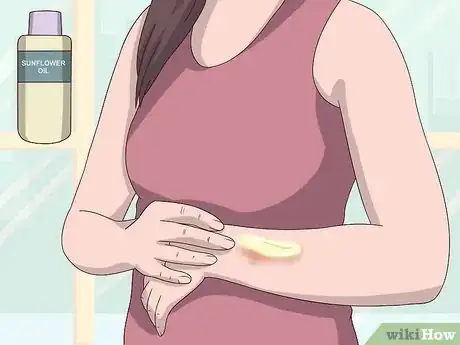
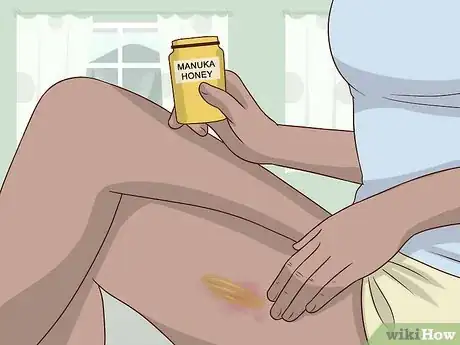
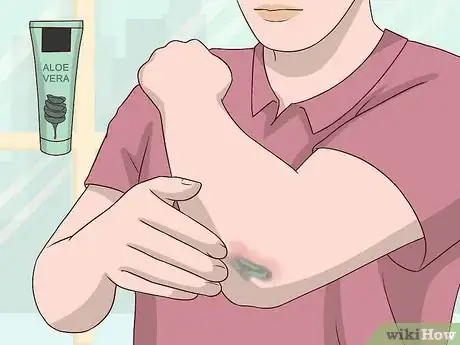

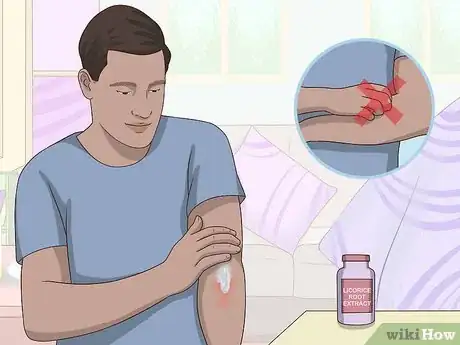

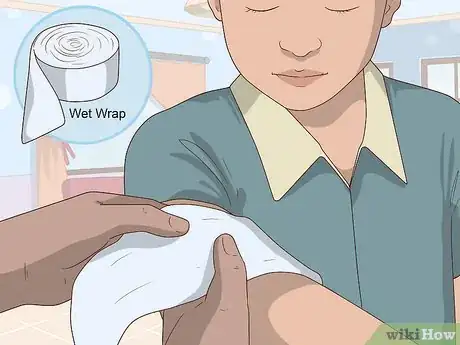

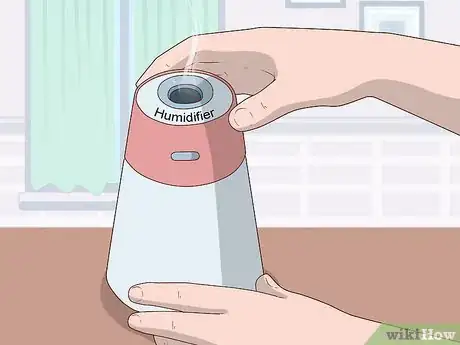
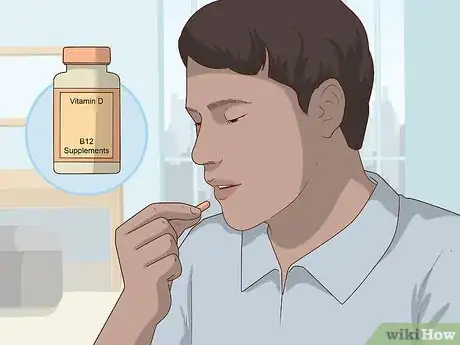
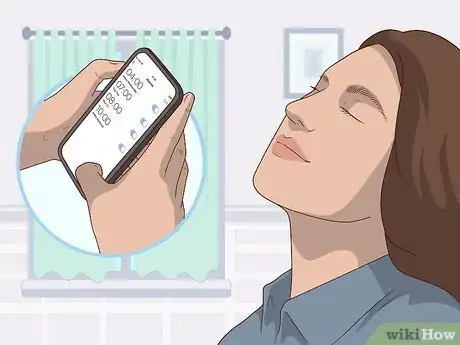
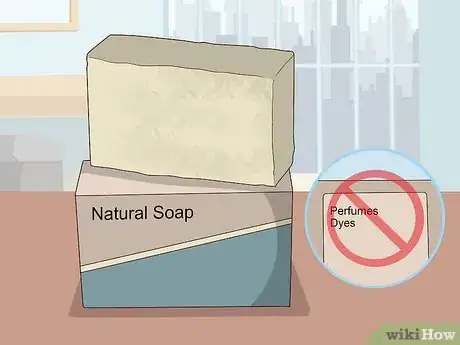


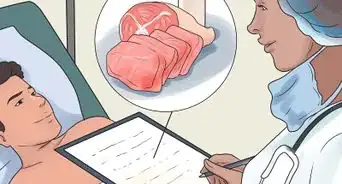
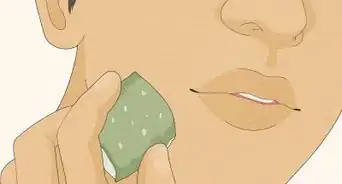



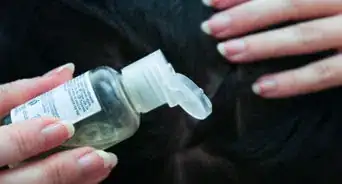
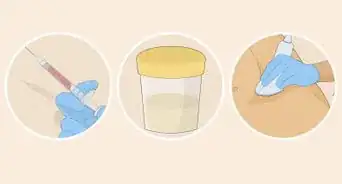
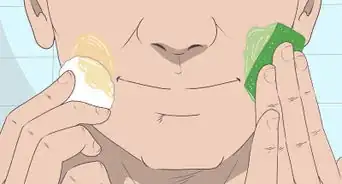














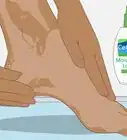






































Medical Disclaimer
The content of this article is not intended to be a substitute for professional medical advice, examination, diagnosis, or treatment. You should always contact your doctor or other qualified healthcare professional before starting, changing, or stopping any kind of health treatment.
Read More...